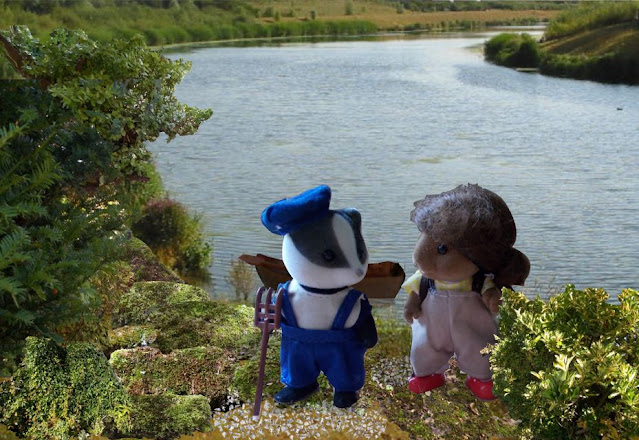Yep. It's Darcy.
I was re-reading Jackson's story about the Victorians and was struck by his reaction to the appendices in Merlin's book "The History of Man". Specifically, his curiosity about the worst events in - what I assume - is part of human history. It made me wonder: why don't we as Sylvanians have any such dark past? Not that we want one. I was curious about the nature of good and evil, I suppose.
My reporting background kicked in. Who might know? I went to see Sheriff Bisto Wildwood. He settles disagreements. He assesses non-Sylvanian behaviour. A good place to begin.
No point in delaying matters. I went to the Sheriff's Department, where I was greeted by Consuella Lopez on reception.
She waved me through to speak to Bisto.
o 0 O 0 o
"Evil Sylvanians?" he laughed. "You might well ask about dehydrated water. It's not our nature. You must know that."
"I do. But I don't know why it isn't our nature."
He scrunched his muzzle in thought. "Philosophy is probably Kelvin Waters' domain. My job is to calm the waters..." - he smiled - "...when opinions differ. There's usually a middle way that I can suggest."
"Kelvin. Right," I said, rubbing my chin. "So you've never encountered any really bad people?"
"No." He paused, searching his memory. "Not personally. Although there were reports about a dozen years ago. Information from assorted Sylvanian police representatives across the land about a character who popped up here and there, stealing. Even threatening crittizens."
"Why haven't I heard about this before?"
"Villages don't tend to publicise problems, preferring to deal with them. If there was an actual villain, they wouldn't want to give him publicity."
I was incredulous. "Wow. An actual bad Sylvanian."
Bisto shook his head. "I don't think he was Sylvanian. Certainly his behaviour was alien. Wherever he came from, he reportedly wasn't like any critter we'd encountered."
"Don't know. They called him the Packbat."
o 0 O 0 o
I delved further, but Bisto didn't have much further information. There was something, though.
"Reportedly, he was a bad influence on some Sylvanians," the Sheriff said when pressed. "In one place he convinced some Slydales to play a minor role in his schemes. I get the impression he deceived them."
"He sounds a nasty piece of work."
"He does. We're lucky he didn’t come here."
"So, what happened to him?"
"I don't know. The police reports say they brought in a consultant..." He slapped his forehead.
"What?"
"The consultant was an expert in weird stuff. Paranormal thingies."
"What? Like Mulder Honey-Fox?"
"Exactly like Mulder Honey-Fox. It was him."
o 0 O 0 o
Mulder Honey-Fox and his wife moved to Mellowdene twelve years ago or thereabouts. He'd never really explained his work but I was given to believe that he was some sort of detective who dealt with odd cases, and was called in by other Sheriff and Police Departments around Sylvania when needed. He'd settled here and started a family, lending his problem-solving and lateral-thinking skills to the more mundane issues encountered by the council.
I arranged to meet him in his home office and got straight to the point asking about this supposed villain.
He breathed out noisily, curling his lip. "Packbat. Now there's a name from the past."
"Briefly. I'd been called in by Pandaville Police to help locate him and suggest reasons for his motives. They had records of places he'd been seen from all over Sylvania. There was no obvious pattern to his choice of location, and his crimes were not wholly consistent."
"Was he there in Pandaville?"
"No, I'd missed him, but I did get an opportunity to look at the evidence gathered."
"And?"
The fox regarded me curiously. "How much do you want to know? I wouldn't want scare stories to appear in your newspaper."
"I'm curious but not irresponsible Mister Honey-Fox. It's for me, not the Mellowdene Examiner."
"Fair enough. Get comfortable and I'll tell you what I know."
(To be continued)
o 0 O 0 o





































